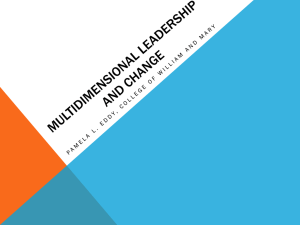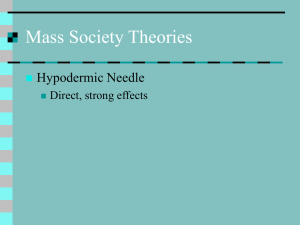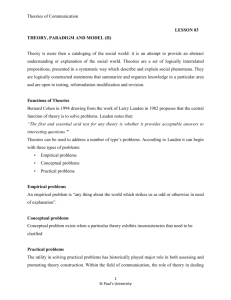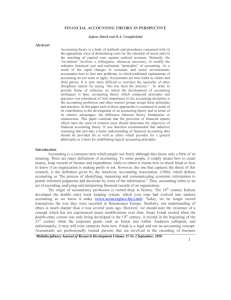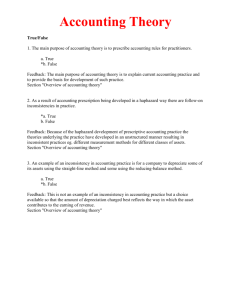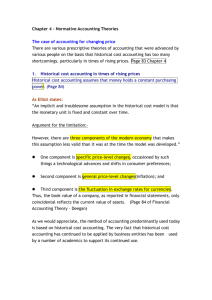Theories of Communication LESSON 04 FROM COMMUNICATION
advertisement
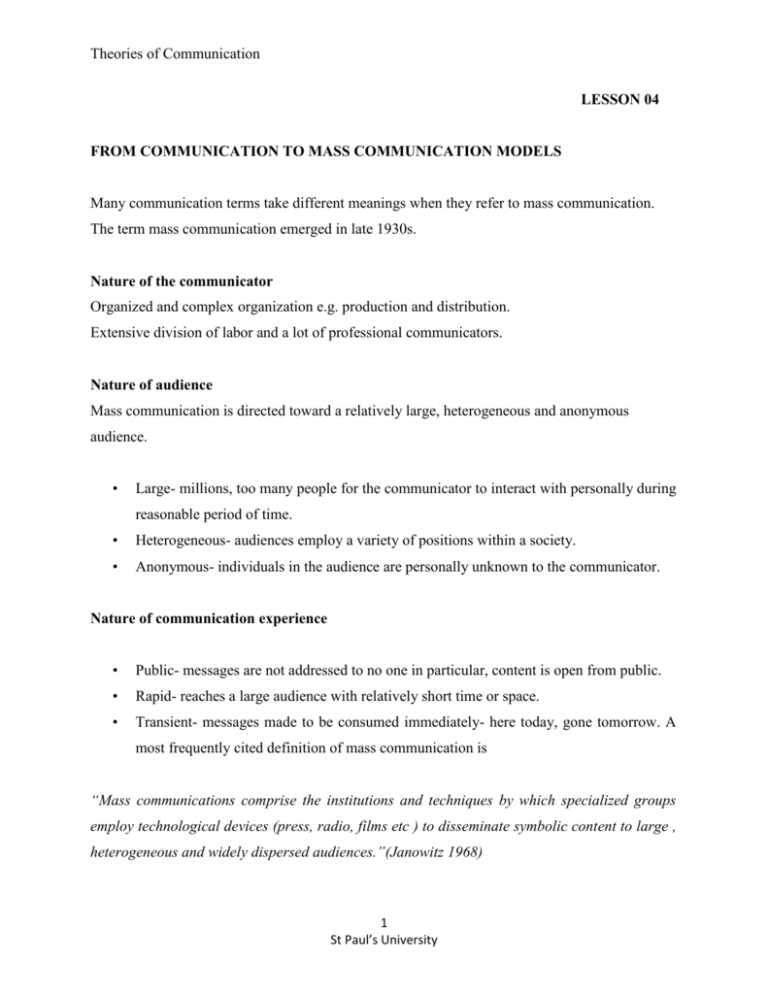
Theories of Communication LESSON 04 FROM COMMUNICATION TO MASS COMMUNICATION MODELS Many communication terms take different meanings when they refer to mass communication. The term mass communication emerged in late 1930s. Nature of the communicator Organized and complex organization e.g. production and distribution. Extensive division of labor and a lot of professional communicators. Nature of audience Mass communication is directed toward a relatively large, heterogeneous and anonymous audience. • Large- millions, too many people for the communicator to interact with personally during reasonable period of time. • Heterogeneous- audiences employ a variety of positions within a society. • Anonymous- individuals in the audience are personally unknown to the communicator. Nature of communication experience • Public- messages are not addressed to no one in particular, content is open from public. • Rapid- reaches a large audience with relatively short time or space. • Transient- messages made to be consumed immediately- here today, gone tomorrow. A most frequently cited definition of mass communication is “Mass communications comprise the institutions and techniques by which specialized groups employ technological devices (press, radio, films etc ) to disseminate symbolic content to large , heterogeneous and widely dispersed audiences.”(Janowitz 1968) 1 St Paul’s University Theories of Communication Then mass communication is always part of an organized group and often a member of an institution which has functions other than communication The receiver is always an individual but may often be seen by the sending organization as a group or collectively with certain general attributes. Channel Channel includes large scale technologically based distribution devices and systems. The message in mass communication is not a unique and transitory phenomenon but a mass produced and infinitely repeatable symbolic structure, often of great complexity. Of particular significance in mass communication are:1. The public and open nature of all communication. 2. The limited and controlled access to sending facilities. 3. The impersonality of the relationship between sender and receive. 4. The imbalance of the relationship between them. 5. The intervention of institutionalized arrangements between sender and receiver. The process of mass communication is not synonymous with the mass media. It is the organized technologies which make mass communication possible. Development in the history of mass communication DeFleur and Ball Rokeach in 1989 point out to a number o important developments in the history of mass communication 1. Age of signs and signals 2. Age of speech and language 3. Age of writing- papyrus 4. Age of printing – after 15th century-Gutenberg’s invention of moveable type and printing press in 1456 5. Age of Mass Communication was ushered by widespread distribution of newspapers (1920 radio; 1940 TV) 2 St Paul’s University Theories of Communication It eroded the barrier of isolation among people in the world and produce significant changes in the organization and functioning of a society – in commerce politics education in mere sociability gossip. Mass media includes: Print media 1. Books 2. Newspapers i) In the beginning adversary of established power. ii) Political press –for party advantage and political propaganda. ii) Prestige press- high bourgeois capitalist class. Electronic media 1. Film 2. Broadcasting 3. Recorded music VCR New media - Telematix media They combine telecommunication and information. It includes • Video games • Virtual reality • CD- ROMs They represent a challenge. Decentralization – supply and choice are not longer predominantly in the hands of supplier of communication. High capacity- cable and satellite deliver overcomes the former restriction of cost distance and capacity Interactivity- receiver can select answer back, exchange and linked to other receivers directly 3 St Paul’s University Theories of Communication Why study mass communication? It is the major source of acquiring about the world knowledge -a cognitive approach a mental reality about the world based on our experience with the media This metal attitude become the basis for all sorts of attitudes and behavior and has numerous effects on our lives. Media is also a place where many affairs of public life are played out both nationally and internationally. The conducts of democratic or undemocratic politics significant social issues are addressed. Media is also a place where changing culture and values of societies and groups are constructed stored and most visibly expressed. Primary key to fame and celebrity status. Media has become the reality against which the real world is compared. The media view of the world has become more real to many people than the real world itself. Media are the single largest focus of leisure- time activity and means of entertainment. They help organize and interrelate the rest of leisure. As a result a media has become a major and expanding industry providing employment and wide range of political economic benefits. That is why mass media is of wide interest and is subject to so much scrutiny and regulation as well as theorizing. And we need to consider theories that deal primarily with the ways individual access and process media content and the ways with which mass media sources influences those individuals. Some sort of theory was needed to guide this task of media reform. The theory should answer questions such as these: 1. Should media do something more than merely distribute whatever content will earn them the greatest profits in the shortest time? 2. Are there some essential public services that media should provide even if no immediate profits can be earned? 3. Should media become involved in identifying and solving social problems? 4. Is it necessary or advisable for media to serve as watchdogs and protect consumers against business fraud and corrupt bureaucrats? 4 St Paul’s University Theories of Communication 5. What should we expect media to do for us in times of crisis? These broad questions about the role of media are linked to issues concerning the day-to-day operation of media. 1. How should media management and production jobs be structured? 2. What moral and ethical standards should guide media professionals? 3. Exactly what constitutes being a “journalist”? 4. Are there any circumstances when it is appropriate or even necessary to invade people’s privacy or risk running their reputation? 5. Should television networks broadcast highly rated program even if it routinely contains high levels of violence? Answers to questions like these are found in NORMATIVE THEROY- a type of theory that describes an ideal way for a media system to be structured and operated Normative theories are different from most of the theories we will study. They don’t describe things as they are nor do they provide scientific explanations or predictions. Instead they describe the way things should be if some ideal values or principles are to be realized. Normative theories come from many sources. Sometimes they are developed by media practitioners themselves. Sometimes they are developed by social critics or academics. Sometimes it is the synthesis of ideas developed over the past centuries. A SHORT EXERCISE Take a few minutes off, before we proceed, to think about your views concerning the role of media for yourself, about your community and your state, your nation and your world. • What are the most important things that media should and shouldn’t do? • What standards of behavior should media practitioners follow as they perform these 5 St Paul’s University Theories of Communication tasks? • What about the high percentage of entertainment programming on television? • Should there be less entertainment and more content that informs and educate? 6 St Paul’s University






